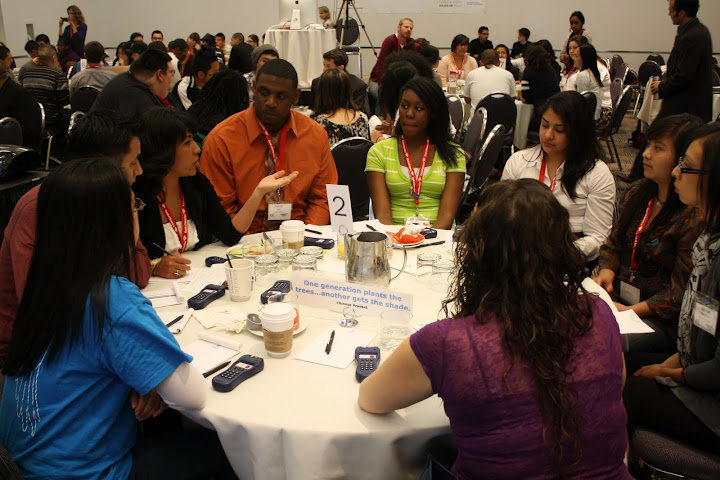
@MEnista: U.S. won’t solve serious problems if we don’t tap into power of Millennials
During a Mobilize.org summit in San Jose, students use interactive keypad voting to discuss what policy makers, college faculty/administrators and students themselves can do to improve college completion rates in their community.
In communities across the country, Mobilize.org empowers and invests in Millennials to create and implement solutions to social problems. With support from Knight Foundation, the organization is bringing its Millennial-led engagement efforts to five Knight communities: Detroit, San Jose, Charlotte, Philadelphia and Miami. Recently, Maya Enista Smith, CEO of Mobilize.org talked with Knight about the project at the Gathering of Leaders in Miami, which brings together social entrepreneurs to help them accelerate social change. Knight Foundation: Mobilize.org’s mission is to empower and invest in Millennials to create and implement solutions to social problems. What is your programming model? Maya Enista: Our model is to convene, invest and train in this generation of leaders to solve the problems that they face in their communities. We believe that young people are best equipped to solve these problems and it is our role to support them. For example, we recently convened a group of 100 community college students in San Jose, Calif. to talk about the obstacles that they face with respect to community college completion. We provided the students with the opportunity to work collaboratively to propose solutions to those challenges and asked them to compete for a share of $25,000 to identify and support the most innovative solutions. Now with Mobilize.org funding, undocumented students that face financial and emotional challenges will have a place where they can go to talk to someone, print their papers, use the Internet and gain moral support with peers. A mentorship and counseling program will also help foster care children properly transition into college life, and video and editing support will be available for student organizations on campus who are doing good work but who have trouble making their ideas and solutions visible. All of the winning project descriptions are available online.
Mobilize.org is coming to Miami for a summit in June. What will it entail?
With support from Knight, Mobilize.org will convene 100-150 Millennials currently enrolled in South Florida’s community colleges. Students will have the opportunity to collaborate with civic leaders, administration officials and faculty on ways they can work together to tackle issues students face on their campus and communities. On the final day, individuals and teams proposing the top five solutions, selected by Millennial participants utilizing interactive keypad voting technology, will receive financial investments up to $7,500 from Mobilize.org. Winners will also participate in the Mobilize.org Fellowship program, a 12-month virtual and in-person leadership development program that equips them with the skills and resources they need to become civic entrepreneurs. The website for the Target 2020 Florida Summit is online.
How do you see technology affecting the way young people communicate? Does it have a large impact on your organization? I talk often about the role of technology for the Millennial generation. It’s been such a blessing to us, because it has allowed us to break down traditional barriers that have existed previously. For example, I just gave a speech in Peru. I wasn’t in Peru, but I got to be with 1,500 young people from around the world because of technology. Technology is here to stay, it’s the next iteration of how our society communicates. I’m lucky to be of the generation that is really pioneering these tools. Technology is one of the biggest assets our society has. What do you find challenging about the work you do? It’s great that people have greater access to information and knowledge because we’re able to build community in totally different ways than before. But it’s also challenging because the concept of community is shifting and people identify themselves in multiple ways. The trick is finding ways to get people to participate and to engage more people to join the conversation. We want to help this generation identify themselves as leaders. Where do you see the future of the Millennial engagement heading? What are opportunities over the next few years? This generation holds tremendous power and potential to create change. If you look at what an organization like Code for America is doing or the work of Breaker, you see both new and old organizations that are embracing technology. They are embracing the Millennial way of collaborating and promoting entrepreneurialism. They’re using all of their assets to solve serious problems. Engagement used to be a “nice, not necessary, thing.” But now, led in a large part by Millennials, engagement is necessary. Our society isn’t going to function or improve and we’re not going to solve the serious problems we have if we don’t tap into the leadership potential of this generation.
Recent Content
-
Communitiesarticle ·
-
Communitiesarticle ·
-
Communitiesarticle ·


